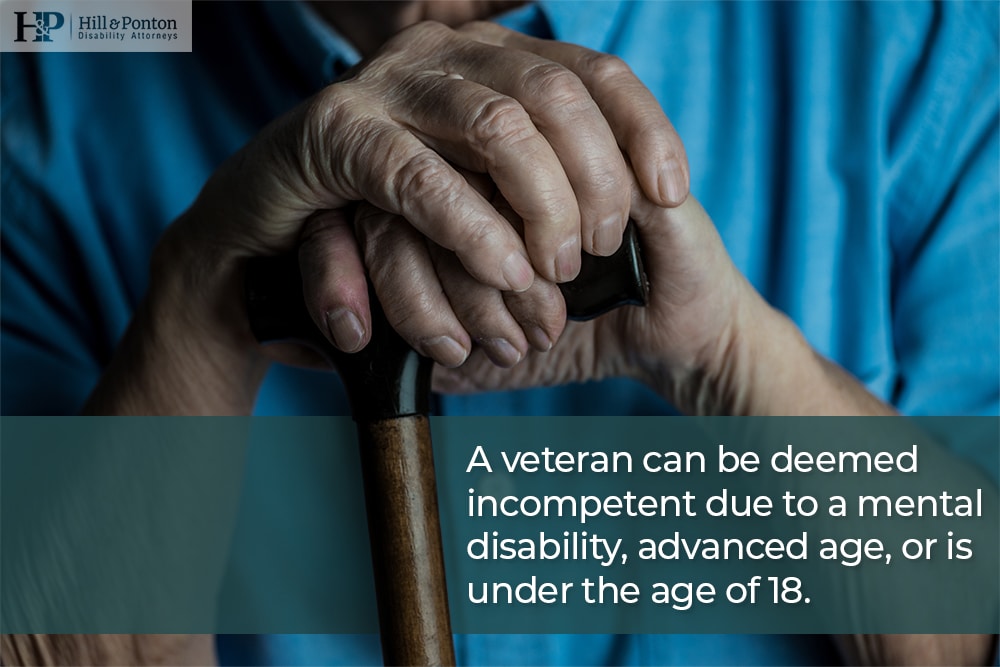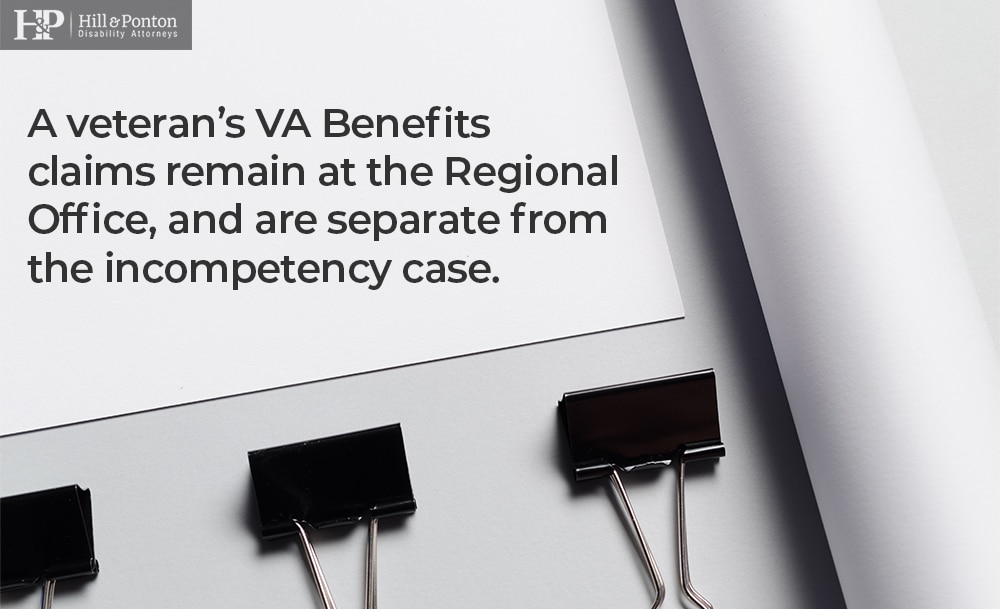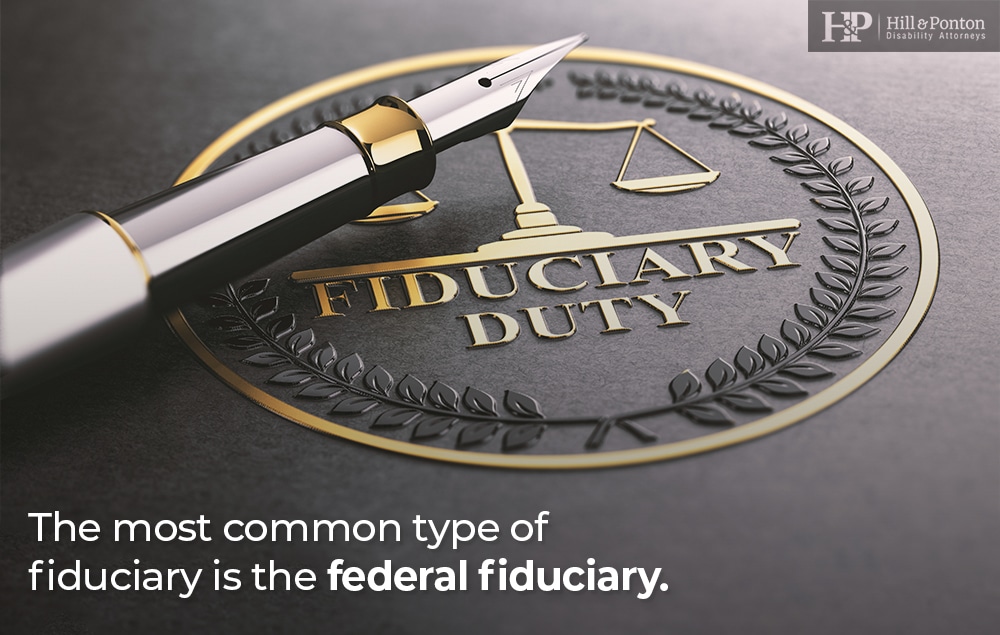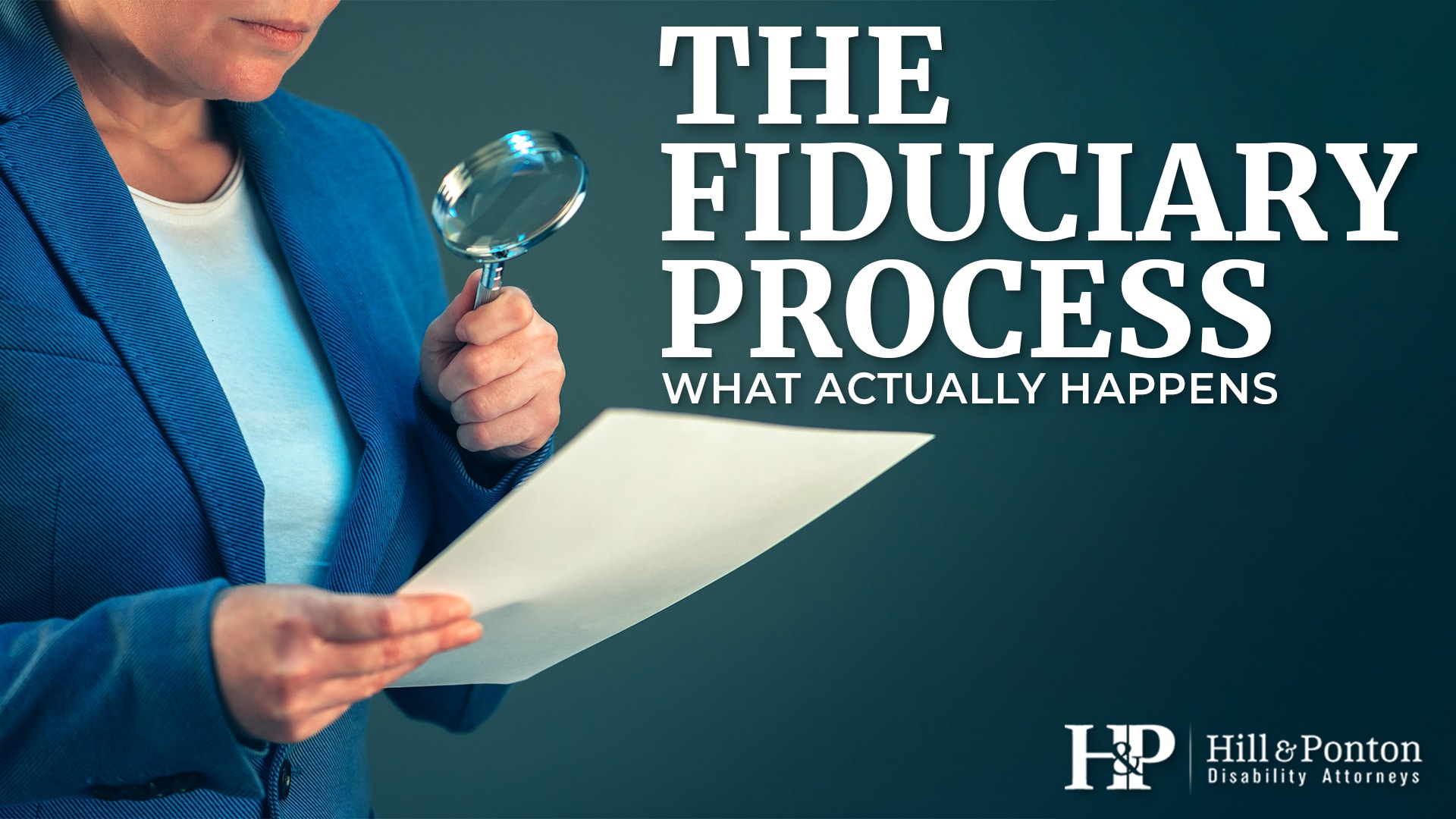There are many veterans and/or beneficiaries who are unable to manage their VA benefits. The VA has a Fiduciary Program to protect these veterans by providing a fiduciary, or trustee, who manages the benefits paid to a veteran.
A veteran can be deemed incompetent due to a mental disability, advanced age, or is under the age of 18.
A finding of incompetence must be supported by medical evidence or a court ruling. In some cases, a court may have ruled a veteran is incompetent, and then the VA will also find them incompetent to manage their benefits.

When this happens, a fiduciary is appointed. It is important to note that when a veteran is found incompetent by the VA to manage his/her benefits, this will not affect his/her right to handle other finances or assets.
This blog post will take you through the steps in the fiduciary process. The information in this post comes from the VA’s internal manual and from our experiences in the practice of VA law.
PART A – THE ISSUE OF INCOMPETENCY
The VA’s fiduciary process is incredibly complex and confusing. While the complexity of the process might be a good thing—ensuring that whoever manages the beneficiary’s money is well chosen—it can very stressful on the beneficiary while he/she waits to find out who will be managing their money.
How Does Incompetency Come Up?
The question of incompetency usually appears in a Compensation and Pension (C&P) exam. In more rare cases, it might come from a veteran’s treating doctors or social worker. However, more often than not, the C&P examiner is the one to raise the question of incompetency, and usually it happens during an examination for an increase in rating for a mental disorder.
The new Disability Benefits Questionnaire form the mental disorders devotes a section for competency. Specifically, it instructs the examiner to ask if the veteran is capable of managing his/her financial affairs. If the examiner checks the “No” box, further explanation is required.
Often we see that, in response to this question, a veteran will give a vague response—“My wife pays the bills and manages my money.” While this might be the veteran’s preference (he’d rather not deal with the bills if his wife can do it), he may be quite capable of managing his financial affairs on his own if his wife was unable to take care of it for him.

However, the C&P examiner’s interpretation of this statement might be quite the reverse: that the veteran would be completely unable to manage his financial affairs in the absence of his wife. Moreover, if a review of the veteran’s financial history corroborates this interpretation, the examiner may be likely to opine that the veteran is not competent to manage his or her money.
This is where it gets tricky. While the examiner might opine that a veteran is incompetent, the decision is ultimately up to the VA rater reviewing the case.
More often than not, the rater defers to the examiner’s opinion. And in the best interests of the veteran, the rater may propose that a fiduciary be appointed to assist in the management of the veteran’s financial affairs.
What Happens When the C&P Examiner Proposes Incompetency?
When a rater from the Regional Office receives an indication that a veteran may be incompetent to manage his/her money, the rater must issue a notice to the veteran that incompetency has been proposed.
As is the case with other proposals of action, the veteran is given 30 days in which to respond to this notice—either by requesting a hearing, and/or by submitting evidence to support a position that the action should not take place as proposed.
After 60 days (provided that the veteran has not requested a hearing or submitted evidence) the rater can finalize the proposed action. If the veteran requested a hearing, no further action can take place on this issue until the hearing has taken place.
After the 60 days have elapsed (or the hearing taken place), the rater will issue a final decision, which can then be appealed. The decision will either uphold the proposed action or reflect any changes that a hearing or evidence may have affected.

What Happens to My Benefits if Incompetency Is Proposed?
If incompetency is proposed, any retroactive benefits due to the veteran will be withheld until a resolution is made. However, the veteran will still receive the monthly check reflective of the current disability ratings.
This means that if a veteran’s rating for Major Depressive Disorder is increased to 100%, but has been proposed incompetent, the veteran will receive his/her monthly checks at the new 100% paygrade, but payment of any retroactive benefits will be postponed.
If the incompetency issue is confirmed, the retro benefits will be released once the fiduciary is appointed; if incompetency is revoked, the retro will be released to the veteran.
What Happens to My Case if Incompetency is Affirmed?
If a finding of incompetency is affirmed, a new process is initiated. The veteran’s VA Benefits claims remain at the Regional Office, and are separate from the incompetency case. This means that the veteran can continue to file claims and pursue the claims process while the incompetency case is being processed at the Fiduciary Hub.
What Rights Do Veterans Have?
Veterans in VA’s fiduciary program do have rights. These rights include, but are not limited to, the right to be notified when VA appoints a fiduciary and to appeal that appointment to the Board of Veterans’ Appeals.
The veteran may also request that VA replace the current fiduciary with a new fiduciary, and if he/she has concerns about a VA-appointed fiduciary, it is imperative they contact the VA right away.
If a veteran would like a new fiduciary, again, he/she should let the VA know immediately. A new fiduciary, by rights, can be assigned to a veteran at any time.
A veteran can avoid getting deemed incompetent by the VA. When disability compensation is applied for, the VA will send the veteran for a Compensation and Pension (C&P) exam at a local VA facility to evaluate the disability.
If asked about the ability to manage his/her own money, the veteran should state very clearly that he/she is very capable. The examining physician will write a detailed report for the VA, and any answers pertaining to money management will be noted in the report. Telling the doctor that help is needed may cause an incompetency decision.
PART B – THE FIDUCIARY PROCESS

What Is The Fiduciary Process?
When a final determination of incompetency is made, the case is transferred to the Fiduciary Hub closest to the veteran. The Fiduciary Hubs are regional, which means that multiple states are under the jurisdiction of one Fiduciary Hub.
The VA rater sends a request to the veteran’s local Fiduciary & Field Examination (F&FE) office to find a suitable fiduciary for the veteran.
The fiduciary process involves:
- In-home visit by a Field Examiner with the veteran
- Interview with the fiduciary candidate
- In-depth investigation of the fiduciary candidate
- Installment of the fiduciary appointee when approved
- Determination of commissions
- Installment of safeguards for the veteran
What Should I Expect From the Field Examiner’s Visit?
The first thing that will happen in the fiduciary case is a visit from a field examiner. A field examiner is an employee of the Veterans Administration, who is responsible for choosing, supervising, and ensuring the compliance of a suitable fiduciary for the beneficiary (veteran). In order to best assess the needs of the veteran, the field examiner will visit the veteran in his/her home.
The visit is coordinated by the local Fiduciary Hub. This visit will give the field examiner an idea of the veteran’s lifestyle, financial situation and healthcare needs.
To that end, the field examiner is likely to ask for detailed financial information—such as current expenditures, bills, debt—as well as what the veteran intends to do with the retroactive benefits (if applicable) once the funds are released.
Specifically, field examiners are instructed to evaluate and document the following areas:
- Physical and mental conditions (including age, appearance, physical limitations & mental condition)
- Beneficiary’s orientation to time, place and events
- Current medications, health problems, and prognoses
- Capacity to manage funds
- Inventory (any major assets, such as checking & savings accounts, vehicles, real estate, expensive luxury items, investments)
- Income, verification of funds & documenting fund usage
- Fund use and standard of living (how much is spent on household items, such as mortgage/rent, taxes, food, insurance, utilities)
- Social and industrial adjustment (such as social relationships, how beneficiary spends his time, work capability, capacity for being retrained for work)
- Environment (surroundings, standard of living, any other household members)
- Dependents and their needs
- Next-of-kin information
- Possible changes to benefit entitlement
If the preferred fiduciary candidate is already present at the visit (in the case of a wife /husband or family member), the field examiner will most likely conduct a private interview with that individual during the visit. If the fiduciary candidate is not present at the visit, a separate interview will be scheduled with that individual.
What Happens After The Field Examiner’s Visit?
Once the initial visit occurs, the field examiner will investigate the potential fiduciary. The investigation is very thorough; in fact, the VA’s internal handbook clearly states that “VA’s failure to properly investigate a fiduciary may result in a finding of negligence which will require VA to reissue any misused benefits.”
To that end, the field examiner must obtain a credit report (spouses are excluded from this requirement), run a background check, and obtain statements from character witnesses for that individual.

How Are Fiduciary Appointees Chosen?
The most common type of fiduciary is the federal fiduciary. Court-appointed fiduciaries exist as well, but they are used only in rare and extenuating circumstances. Federal fiduciaries can be any of the following:
- Spouses (most common)
- Legal Custodian
- Institutional award payee
- Office of an Indian reservation
- Custodian-in-fact
- Temporary fiduciary
For purposes of this post, we are going to discuss only the first two, as they are the most common.
The VA is very clear about the importance selecting a fiduciary that most suits the veteran’s needs and, where feasible, preferences. In particular, the VA’s internal handbook states that the field examiner must:
- Determine the most effective, practical, and/or economical type of fiduciary appropriate to the situation;
- Discuss payee selection with the beneficiary to the extent possible; and
- Take into consideration the beneficiary’s request, where feasible.
When determining the suitability of a fiduciary candidate, the field officer must obtain/consider the following:
- Full name, address, date of birth
- Occupation
- Relationship to the beneficiary
- Educational level
- Credit report information (with exception of spouse or parent)
- Response to criminal background check inquiry
- Character witness statements
What Happens Once a Fiduciary is Chosen?
Once the field examiner has conducted a thorough investigation and in-person interview with the fiduciary appointee, the field examiner will notify the beneficiary via official notification (like a Rating Decision). The field examiner will most likely discuss the decision with the veteran in person or over the phone.
- If the fiduciary is determined to be the spouse, the spouse will receive a packet in the mail to fill out;
- If the fiduciary is determined to be an individual other than the spouse, the veteran will receive a letter with the appointee’s information, and an appointment will be scheduled for an in-person meeting with the appointee and the veteran. At this meeting, the appointee will obtain all the financial information needed take over financial responsibilities.
The premise of the fiduciary system is to protect the veteran and his/her assets. Tied into that is a resolution to make the process as painless to the veteran as possible. Naturally, the simplest solution is the appointment of the spouse as the fiduciary.
However, in circumstances where there is no spouse or the spouse is not the most suitable choice, the VA sets multiple safeguards in place to ensure that the chosen fiduciary is best suited to the veteran.




